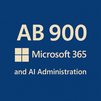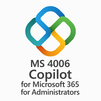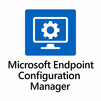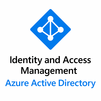-interview-questions-answers.jpg)
The Microsoft 365 Administrator Essentials (MS-102) Training course equips participants with the skills required to efficiently manage and secure Microsoft 365 services. This comprehensive course covers identity management, security, compliance, and supporting technologies. Learners will delve into configuring, managing, and troubleshooting Microsoft 365 environments, gaining insights into optimization, collaboration tools, and hybrid integration. Ideal for IT professionals aiming to enhance their expertise in Microsoft 365 administration.
Microsoft 365 Administrator Essentials (MS-102) Interview Questions Answers - For Intermediate
1. What is the role of the Security & Compliance Center in Microsoft 365?
The Security & Compliance Center in Microsoft 365 is designed to provide comprehensive tools to manage compliance features, data governance, audit reports, and security policies that help protect data and maintain compliance with legal and regulatory standards.
2. How does Microsoft 365 implement disaster recovery?
Microsoft 365 implements disaster recovery through data redundancy, automatic failover processes, and robust backup strategies across geographically dispersed data centers to ensure continuous service and data availability.
3. Explain the process and importance of license management in Microsoft 365.
License management in Microsoft 365 involves assigning the correct type of licenses to users based on their role and usage needs, which ensures cost-efficiency and compliance with Microsoft licensing terms. It's managed through the Microsoft 365 admin center where administrators can allocate, monitor, and adjust licenses as necessary.
4. What is Azure Information Protection, and how is it integrated with Microsoft 365?
Azure Information Protection (AIP) is a cloud-based solution that helps organizations classify and protect documents and emails by applying labels. AIP integrates with Microsoft 365 to secure data across the cloud and on-premises, ensuring that sensitive information is encrypted and accessible only by authorized users.
5. How do you configure external sharing in SharePoint Online?
External sharing in SharePoint Online is configured in the SharePoint admin center by setting up policies that govern how users can share content with people outside the organization, including what items are shareable, who can share externally, and the permissions outsiders are granted.
6. Can you describe the Microsoft 365 Admin Center's role in administration?
The Microsoft 365 Admin Center is the primary tool for managing all aspects of the Microsoft 365 environment, including user and group management, billing, licensing, service settings, and health monitoring. It provides a centralized interface for administrative tasks and oversight.
7. What steps are involved in setting up Multi-Factor Authentication (MFA) in Microsoft 365?
Setting up MFA in Microsoft 365 involves enabling MFA in the Azure AD portal, configuring user settings to require additional authentication methods, and guiding users through the setup of their secondary authentication method (like a phone call, text message, or app notification).
8. Discuss the importance of compliance features like eDiscovery in Microsoft 365.
eDiscovery in Microsoft 365 is crucial for legal and compliance purposes as it allows organizations to identify, hold, search, and export content found in Microsoft 365 services in response to legal requests or investigations. It helps manage corporate data and legal risks effectively.
9. How do you use Microsoft Intune in Microsoft 365 management?
Microsoft Intune is used in Microsoft 365 to manage mobile devices and applications. It allows administrators to set security policies, and configure settings on personal and organization-owned devices to ensure data protection and compliance with company policies.
10. What is the functionality of the Compliance Manager tool in Microsoft 365?
The Compliance Manager tool in Microsoft 365 helps organizations meet complex compliance obligations with risk assessments, recommended actions, and a detailed compliance score that reflects the organization's adherence to data protection and regulatory standards.
11. Describe how to manage guest access in Microsoft Teams.
Managing guest access in Microsoft Teams involves configuring settings in the Microsoft Teams admin center to control how guests can participate in Teams and access resources. This includes setting policies for chat, meetings, calling, and application permissions.
12. What are retention policies, and how do they function in Microsoft 365?
Retention policies in Microsoft 365 help manage the lifecycle of data by specifying how long content is retained or when it should be deleted. These policies are applied across various services like Exchange, SharePoint, and Teams to ensure data governance.
13. Can you explain the different types of security reports available in Microsoft 365?
Microsoft 365 offers various security reports, including audit logs, sign-in logs, and risk analysis reports, that help administrators track user activities, identify potential security threats, and review the effectiveness of current security measures.
14. How does Microsoft 365 support remote and hybrid work models?
Microsoft 365 supports remote and hybrid work models through its cloud-based services like Teams for communication, SharePoint for collaboration, and security solutions that allow employees to work securely from anywhere.
15. What are the best practices for securing a Microsoft 365 deployment?
Best practices for securing a Microsoft 365 deployment include implementing strong password policies, using Multi-Factor Authentication, regularly reviewing and updating access permissions, applying security updates, and training users on security awareness.
Microsoft 365 Administrator Essentials (MS-102) Interview Questions Answers - For Advanced
1. What measures would you take to optimize performance and manage resources effectively in Microsoft 365?
To optimize performance and manage resources effectively in Microsoft 365, it’s important to regularly review usage and performance metrics through the Microsoft 365 admin center. Implementing monitoring tools and services like Microsoft Insights can help identify underutilized resources and potential performance bottlenecks. Resource allocation should be dynamically adjusted based on usage trends and business needs, leveraging scaling options within the platform. Additionally, training end-users on efficient use of resources and implementing best practices for data storage and sharing can prevent unnecessary strain on system resources.
2. How would you configure and enforce data retention policies in Microsoft 365 for legal compliance?
Configuring and enforcing data retention policies in Microsoft 365 involves understanding the specific legal requirements for data retention applicable to the organization. This can be managed through the Security & Compliance Center by setting up retention labels and policies that automate the retention and deletion of content. These policies should be applied across email, documents, and chats to ensure comprehensive coverage. Regular audits and reviews of retention policies are essential to ensure they remain in compliance with changing legal standards and organizational needs.
3. Discuss the role and configuration of Azure AD Privileged Identity Management in securing Microsoft 365 environments.
Azure AD Privileged Identity Management (PIM) plays a crucial role in securing Microsoft 365 environments by providing just-in-time privileged access to reduce the risk of security breaches due to excessive or unnecessary permissions. Configuring PIM involves setting up eligible and active roles, defining the requirements for activating a privileged role, such as multi-factor authentication or approval workflows, and specifying the duration for which the privileges are granted. Regular reviews and audits of privileged roles and access are necessary to ensure that only necessary personnel have elevated rights and only when needed.
4. Explain the integration of Microsoft 365 with on-premises Active Directory environments.
Integrating Microsoft 365 with on-premises Active Directory (AD) environments typically involves using Azure AD Connect to synchronize on-premises AD identities with Azure AD. This synchronization supports various authentication methods, including password hash synchronization, pass-through authentication, and federation, depending on the organization’s security requirements and infrastructure. The integration allows for a seamless user experience, with single sign-on capabilities and centralized management of identities and access policies across on-premises and cloud resources.
5. How can Microsoft 365 help in achieving and maintaining ISO/IEC 27001 compliance?
Microsoft 365 can assist in achieving and maintaining ISO/IEC 27001 compliance by providing a comprehensive set of security and compliance tools that support the establishment, implementation, maintenance, and continuous improvement of an information security management system (ISMS). Features such as data loss prevention, advanced threat protection, security management, and detailed audit logs help in addressing the standard’s requirements. Additionally, Microsoft 365 Compliance Center offers compliance score analysis and recommendations that align with ISO/IEC 27001 controls, facilitating ongoing compliance management and reporting.
6. What strategies do you recommend for managing and securing user identities in a complex Microsoft 365 deployment?
In a complex Microsoft 365 deployment, managing and securing user identities requires a multi-faceted approach. Utilizing Azure AD for identity management is fundamental, with features like Conditional Access policies, Multi-Factor Authentication (MFA), and risk-based conditional access helping to secure identities. Regular reviews of user access rights and the principle of least privilege should be enforced to minimize unnecessary access to sensitive resources. Additionally, user behavior analytics and threat detection capabilities should be employed to identify and respond to anomalous activities that could indicate security incidents.
7. Describe the process for setting up and maintaining secure email communications in Microsoft 365.
Setting up and maintaining secure email communications in Microsoft 365 involves configuring Exchange Online Protection (EOP) to filter spam, malware, and other threats. Implementing Advanced Threat Protection (ATP) with features like Safe Links and Safe Attachments adds another layer of security. For confidential communications, administrators should set up email encryption using Office 365 Message Encryption (OME), which allows emails to be sent securely, even to external recipients. Policies for anti-phishing, anti-spoofing, and DKIM/SPF/DMARC should be rigorously maintained and periodically reviewed to adapt to evolving threat landscapes.
8. How do you handle the migration of large data sets from third-party platforms to Microsoft 365?
Handling the migration of large data sets from third-party platforms to Microsoft 365 requires careful planning and execution. The use of tools like the SharePoint Migration Tool or third-party services like BitTitan or AvePoint can facilitate the transfer of data, maintaining data integrity and minimizing downtime. The migration process should be staged, with critical data being prioritized. Thorough testing and validation are required at each stage to ensure that data is correctly formatted and fully functional in the new environment. Post-migration, extensive user training, and support are necessary to ensure a smooth transition and adoption.
9. What advanced monitoring and reporting tools are available in Microsoft 365, and how can they be used to enhance system management?
Microsoft 365 offers advanced monitoring and reporting tools such as Microsoft 365 admin center analytics, which provide insights into usage patterns and system health. The Security & Compliance Center offers more detailed reports on data governance, audit logs, and compliance management. For more granular monitoring, tools like Microsoft Cloud App Security can be used to analyze and secure cloud applications across the organization. These tools can be leveraged to detect potential security issues, ensure compliance with policies, and optimize the user experience across Microsoft 365 services.
10. Explain the challenges and strategies for implementing Microsoft 365 in a global organization with multiple regional compliance requirements.
Implementing Microsoft 365 in a global organization involves navigating various regional compliance requirements such as GDPR in Europe, CCPA in California, and LGPD in Brazil. Strategies to address these challenges include the use of multi-geo capabilities in Microsoft 365 to store data in specific regions according to local compliance requirements. Establishing a centralized compliance framework in the Compliance Manager that can handle diverse regulations is crucial. Regular training for regional administrators on specific compliance obligations and the tools available in Microsoft 365 to manage these is also essential.
11. How do you ensure the effective use of Microsoft Teams across an organization?
Ensuring effective use of Microsoft Teams involves not only technical deployment but also fostering an organizational culture that embraces collaboration. It is crucial to configure Team settings appropriately for the organization, including security settings and compliance policies. Providing comprehensive training and resources for all users, including best practices for meetings, collaboration, and file sharing, is key. Regular feedback sessions with users can also help identify pain points and areas for improvement, ensuring the tool meets the diverse needs of the organization.
12. Discuss how Microsoft 365 can be leveraged to support remote work and maintain productivity.
Microsoft 365 supports remote work by providing a suite of tools that facilitate communication, collaboration, and productivity regardless of location. Tools like Microsoft Teams, SharePoint Online, and OneDrive allow employees to communicate in real time, share files securely, and collaborate on documents simultaneously. Configuring these tools to be accessible on both organizational and personal devices while maintaining security through measures such as MFA and conditional access ensures that employees can work from anywhere without compromising organizational data.
13. What steps are involved in the continuous improvement of security postures in Microsoft 365?
Continuous improvement of security postures in Microsoft 365 involves regular assessments of current security settings, monitoring emerging threats, and adapting security strategies accordingly. Utilizing Secure Score in Microsoft 365 to receive recommendations on improving security settings and practices is beneficial. Continuous training for users on security best practices, along with regular updates and patches for all software and applications, are also crucial. Engaging in proactive threat hunting and participating in Microsoft security communities for insights and updates can further enhance security measures.
14. How do you plan and execute a successful adoption strategy for Microsoft 365 within a traditionally non-cloud-centric organization?
Planning and executing a successful adoption strategy for Microsoft 365 in a traditionally non-cloud-centric organization requires a detailed change management strategy. This includes leadership endorsement, clear communication of the benefits and impacts of the migration, and extensive training programs. Pilot programs with early adopters can help demonstrate benefits and gather support. Gradual migration, starting with less critical systems, allows the organization to adjust to the cloud environment. Feedback mechanisms should be in place to address concerns and improve the adoption process continuously.
15. Describe the role of artificial intelligence in optimizing Microsoft 365 administration and user experiences.
Artificial intelligence plays a significant role in optimizing both administration and user experiences in Microsoft 365. AI-driven insights and automation can help administrators manage compliance, security, and operations more effectively, identifying patterns and anomalies that could indicate potential issues. For users, AI enhances productivity tools within Microsoft 365, such as Cortana for voice commands, automated insights in Excel, and predictive email sorting in Outlook. These AI features help streamline tasks, reduce repetitive activities, and provide more personalized and efficient user interactions.
Course Schedule
| Dec, 2025 | Weekdays | Mon-Fri | Enquire Now |
| Weekend | Sat-Sun | Enquire Now | |
| Jan, 2026 | Weekdays | Mon-Fri | Enquire Now |
| Weekend | Sat-Sun | Enquire Now |
Related Courses
Related Articles
- Oracle Analytics Cloud: Transforming Business Intelligence in the Cloud Era
- Manage Projects Like Never Before With Primavera Online Training
- How Microsoft Azure Data Engineer [DP-203] Prepares You for Big Data, Streaming & Analytics
- What is the difference between SAP APO and SAP IBP? - SAP IBP Online Training Course
- Role of AWS Data Engineers in the Digital Age
Related Interview
- Openlink Endur Training Interview Questions Answers
- COMOS P&ID (COM-PID) Admin Training Interview Questions Answers
- Salesforce Automotive Cloud Training Interview Questions Answers
- SAP Cloud ALM for Implementation CALM20 Training Interview Questions Answers
- SAP Logistics Execution Training Interview Questions Answers
Related FAQ's
- Instructor-led Live Online Interactive Training
- Project Based Customized Learning
- Fast Track Training Program
- Self-paced learning
- In one-on-one training, you have the flexibility to choose the days, timings, and duration according to your preferences.
- We create a personalized training calendar based on your chosen schedule.
- Complete Live Online Interactive Training of the Course
- After Training Recorded Videos
- Session-wise Learning Material and notes for lifetime
- Practical & Assignments exercises
- Global Course Completion Certificate
- 24x7 after Training Support










 Join our Live Instructor-Led online classes delivered by industry experts
Join our Live Instructor-Led online classes delivered by industry experts